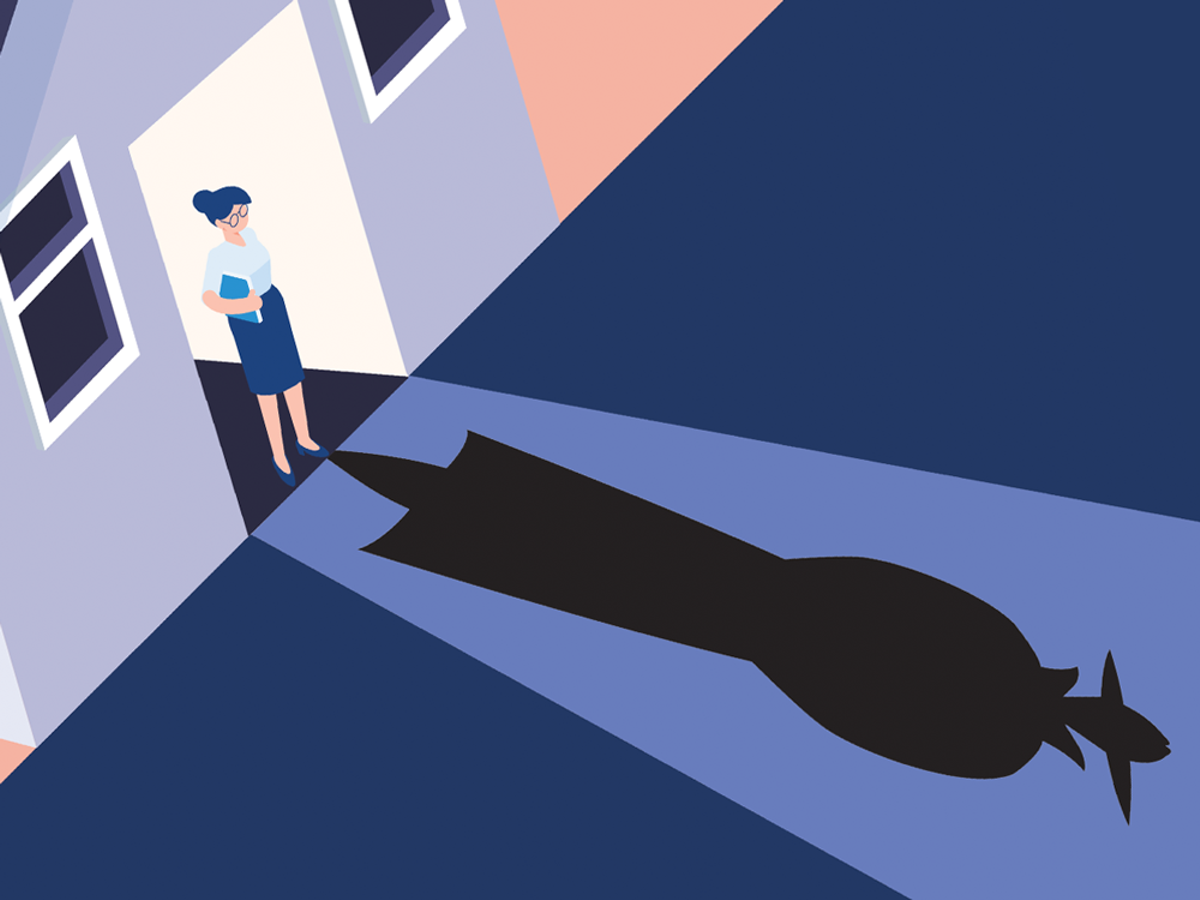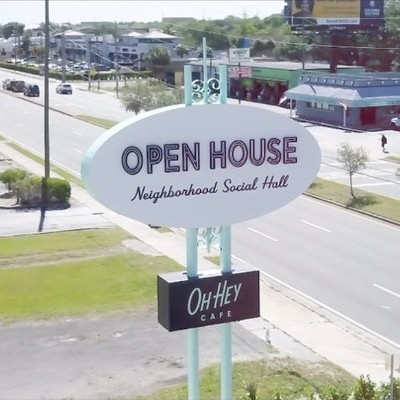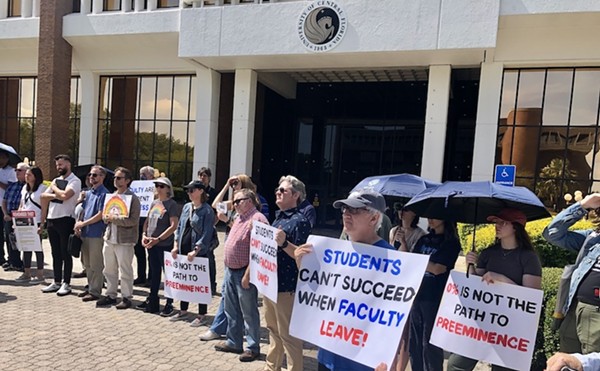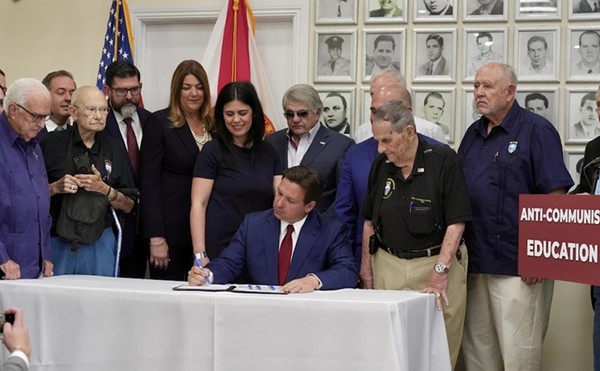"I was asleep in a hotel in Illinois. I awoke to an alert on my phone, saw a truck in the driveway that did not look familiar and a person started walking around to the back of the house. That's when I got on the intercom: 'Hey dude, get the f*ck out of my yard, the cops are on the way.' Basically as soon as I saw this guy in my yard I uploaded it instantly to the Neighbors app. Pretty much within minutes that anyone posts, [law enforcement] have already commented on it and they've got a deputy heading to the neighborhood to check it out."
That's "Stephen, a Volusia County resident," talking in a video on the Ring website about the Ring smart doorbell and its accompanying Neighbors app. His experience might sound heartening to any property owner or tenant, particularly anyone who's had packages disappear off the doorstep or even been burgled.
But after the sobering story of Atatiana Jefferson, a 28-year-old Texas woman shot by a Fort Worth police officer last week in her mother's house while playing video games with her nephew – a story dismayingly similar to so many others, from Aiyana Jones to Botham Jean – isn't it time to consider whether enabling the public at large to quickly dispatch armed officers is a good idea? Nosy-neighbor syndrome is one thing, but adding guns to the mix seems to be a recipe for disaster.
Put a Ring on it
Recently purchased for $1 billion by Amazon (reportedly as a way to save money on stolen deliveries), Ring doorbell and outdoor security devices let people remotely see, hear and talk to whoever is at their door. The company also has an app called Neighbors, in which users post videos and report things they see and hear in their neighborhood. Ring is now joining forces with law enforcement, allowing officers to talk directly to Neighbors users and ask for footage.
Nosy-neighbor syndrome is one thing, but adding armed police to the mix is a recipe for disaster.
tweet this
Police departments can also mark a general region on the Neighbors map that sends out a request-blast to all the users in the area. Users can deny requests, and the police need their consent to access video – but not a warrant. Ring has made it clear it will hand over footage if court ordered or somehow otherwise legally obligated.
"Ring's mission is to make neighborhoods safer," said a Ring spokesperson via email, in response to our request for comment. "We work towards this mission in a number of ways, including working with law enforcement agencies so they can share official, important crime and safety updates and work together with their local community through the Neighbors app."
Ring's founder, Jamie Siminoff, echoes the sentiment in a blog posted to the company's website, saying the Neighbors app connects Ring users and other people for a more vigilant and safer community. On the same post is a video testimonial from Winter Park Police Department officers and Chief Michael Deal.
"We have Ring cameras in our community and we understand the value of those cameras in helping us solve crimes," says Deal, his voice heard over shots of Winter Park homes with Ring cameras on doors and hanging tucked under eaves.
"I was amazed how many cameras were just in our neighborhoods, to begin with," says John Dalles of Winter Park Criminal Investigations.
"As police officers, we cannot be everywhere," says a patrol officer strolling the town's residential streets, "so we rely on our citizens to use the Neighbors app."
Speaking over slow-motion shots of Winter Park police sitting at a conference table or walking through a hallway, the short promotional video ends with Chief Deal: "Being able to reach out to citizens on the Neighbors app when we have a crime, where we have an incident and ask them to share that information with us, is incredible."
Other Central Florida law enforcement agencies teaming up with Ring include the Orlando Police Department, Ocoee Police Department, Davenport Police Department, and the Osceola County Sheriff's Office. Of the more than 400 law enforcement agencies partnered with Ring, over 50 are in Florida.
Since at least mid-2018, Ring has made arrangements with law enforcement all over the country. According to some Central Florida police departments, the program is entirely free.
Civil liberties advocates worry the streaming cameras and chatroom app might turn citizens into informants, and that police access to large swatches of video surveillance could lead to trampling privacy rights. The Neighbors app is similar to NextDoor and Google Play's Citizen in that users have been found to often rely on racial stereotypes in determining suspicion. (A Ring device is not necessary to use the Neighbors app.)
There are no qualms with private citizens making their own decisions, says Ryan Suto of the Washington, D.C.-based Arab American Institute Foundation. "But when police departments get involved, especially the way Ring is pushing these programs to police departments and the opacity with which those partnerships are created, is the beginning of our concern."
Doorbell cameras, though focused on the porch and front yard, extend into public spaces, Suto points out. This could lead to privacy issues and a "disparate impact" of racial profiling of communities of color.
"At various points of times," Suto says, "Americans have been flagged by private individuals as suspicious when they were doing anything anybody else would be doing."
In the same way that partnership details are not public and clear, noted Suto, Ring software is not subject to public scrutiny. Amazon has said it would not use face recognition software in Ring cameras, but there is no mechanism to detect or stop it if they did.
Ring stores video for 30 or 60 days, depending on the user's plan. Footage is then automatically deleted.
In general, finds Suto, public surveillance – or private surveillance of public space – is "superfluous in their operating and take advantage of a climate of fear." Also, general crime is decreasing. "Our fear of crime is not related to the prevalence of crime."
He believes Amazon is profiting off that fear.
"[The Ring program is] turning police into de facto salesman for a company," says Jay Stanley, a senior policy analyst from the ACLU's D.C. office and editor of their Free Future Blog.
The storage and handling of video, he says, is something to worry about. Video, once allowed by the Ring user, is accessed on the cloud. But video is really out of the Ring user's control once it's in the cloud to begin with.
"They say they won't share video without a warrant. We just have to believe that," Stanley says.
A couple of decades ago, police had to get a warrant to ask for the security-camera tape in the garage VCR, notes policy analyst Dr. Matthew Guariglia, who's working on government issues of surveillance for the San Francisco-based Electronic Frontier Foundation.
"That VCR is now the Amazon cloud," he says. "Amazon becomes the keeper and the guardian of that information."
Amazon has been found to train police on the best ways to convince people to fork over their footage, Guariglia says. And once it's in the police hands, or even once it's posted to the Neighbors app or to other social sites like Facebook and Twitter – that video, and that person's face, is around forever.
Ring around the government
This is not the first time an Amazon product has played a role in local law enforcement surveillance.
Before teaming up with Ring, Orlando City Council tried building a surveillance program to identify and track suspects using Amazon's facial recognition technology Rekognition. Though Amazon provided the technology free of charge, the program was cut short in its early stages because it cost the city too much for equipment and to store and maintain nonstop streaming video.
With the Amazon Ring program, the private company provides a network of homeowners' cameras, unlimited storage, and an easy-to-use app – all for free. All it takes for a police department to access the Neighborhood Portal is a non-binding agreement signed by the chief.
The Ring program, some have noted since the rollout, might be a way around the intense attention and public pushback involved when a city government attempts to set up and pay for a surveillance program.
“The Ring program is turning police into de facto salesman for a company,” says Jay Stanley, ACLU senior policy analyst.
tweet this
In 2017 and 2018, Orlando leaders tested Rekognition technology with eight or so cameras posted outside the police department, in downtown Orlando, and at a community recreation center. As Orlando Weekly reported, the Amazon program was free but the city "was not able to dedicate the resources to the pilot," according to a city staffer in a memo to City Council, so Orlando never got far enough to give the program a full live run.
From beginning to end, the Amazon Rekognition pilot process went without substantial public input or scrutiny, or much thought given as to how an ever-present face-reading surveillance program would impact day-to-day life.
Orlando City Council acknowledged the heated response from residents and civil liberties advocates over potential issues with video surveillance. When people found out about the program, critics worried the technology would identify suspects indiscriminately.
An MIT and University of Toronto study found Rekognition technology misidentified women more often than men, and dark-skinned people more often than light-skinned people. This unfortunate racially specific tic put black women in a bad spot. Alongside the local ACLU chapter, Human Rights Watch and Student Immigration Movement condemned Rekognition tech as a tool with far too much potential for tracking people of color, and for targeting and abusing undocumented immigrants.
Multiple Central Florida city commissions did not respond to requests for comments, while others directed questions to the police.
Winter Park city manager Randy Knight, when asked whether or not elected officials and the public should have a say in law enforcement surveillance, responded: "In your question you use the word 'surveillance.' That mischaracterization implies the Winter Park Police Department has access to Ring doorbell footage at will. This partnership with Ring does not give WPPD surveillance capabilities."
Better Ring than sorry
"We're not gonna violate our residents' rights," says Davenport Police Chief Larry Holden. Davenport PD started their Ring partnership this summer.
Holden learned of the program at a police chief conference and thought it would help solve crimes. All it took for the surveillance program to be part of Davenport PD's repertoire was for police leadership to agree to the free program by signing a contract with clear opt-out options. After a couple of hours of training overseen by Ring's legal department on how to post messages, Davenport was good to go.
Other police departments and cities, Holden notes, received free Ring cameras and helped market the product to its residents. He says Davenport hasn't been approached with such an offer and wouldn't accept it if they had. The department sees the program as one of many tools officers use to prevent and investigate crime. He says police strictly only have access to video and information that is volunteered by a user. Even when users comply and share videos, it can be done anonymously. Even the address of the door on which the Ring camera hangs can be left out.
"I wouldn't want to know that," says Holden.
Ring hasn't helped with any criminal investigation the short time Davenport has been part of the program. But it has improved community engagement for the Davenport police, says Holden.
In the early goings of the Ring program, a Davenport resident posted to Neighbors that a woman was at her home and walking around her neighborhood. The wandering woman appeared suspicious to the Neighbors user, who then told police about it. Davenport officers went to the area and found the woman, talked to her, and discovered she was a salesperson.
"We tell our citizens to call us for anything," says Holden, adding he'd rather respond to a false alarm and circle back to follow up than having to deal with a break-in.
"It has helped solve several cases," says Orlando Police Sgt. David Baker, adding the department is always looking for technological advantages but, particularly after the failed Rekognition face-scanning program, is concerned with citizen privacy.
Winter Park Police, who started their deal with Ring over a year ago, used it right away to solve an investigation. And it worked well, they say – Winter Park PD was able to link a person arrested for arson to other crimes in the same neighborhood.
Because of the early success, Ring asked Winter Park Police to be in a video in the hopes of spreading the word to other police departments.
"We agreed to participate at no cost as we believe this is a valuable tool for law enforcement agencies to use to solve crimes, encourage community involvement, and, most importantly, keep neighborhoods safe," Deal says in an email. "Plus, it does not hurt to highlight the great police work being done by the Winter Park Police Department."
The Ring program is free and the company does not require anything from Winter Park PD, said Deal. Winter Park police staff, which has a legal advisor, reviewed the partnership and Deal approved it.
"It is an excellent way for the community to get involved by assisting us in solving crimes and preventing new crimes from occurring in our neighborhoods," Deal says.
He added that Winter Park police have no concerns with the program.
– This story appeared in the Oct. 16, 2019, print issue of Orlando Weekly. Stay on top of Central Florida news and views with our weekly Headlines newsletter.





















